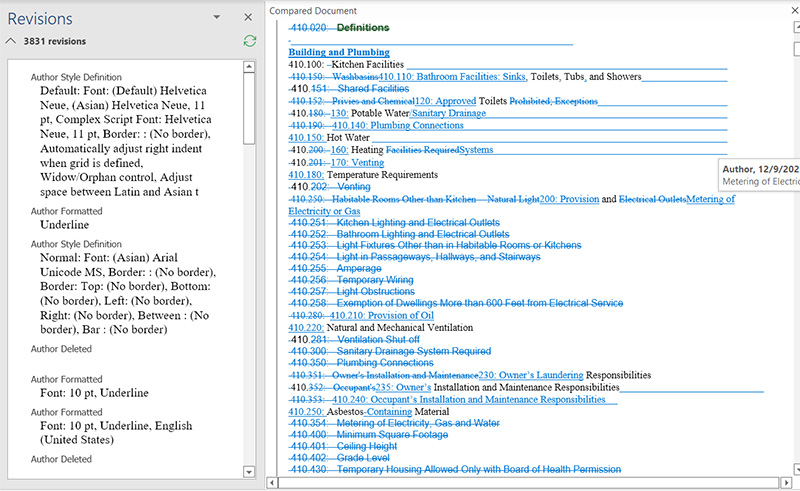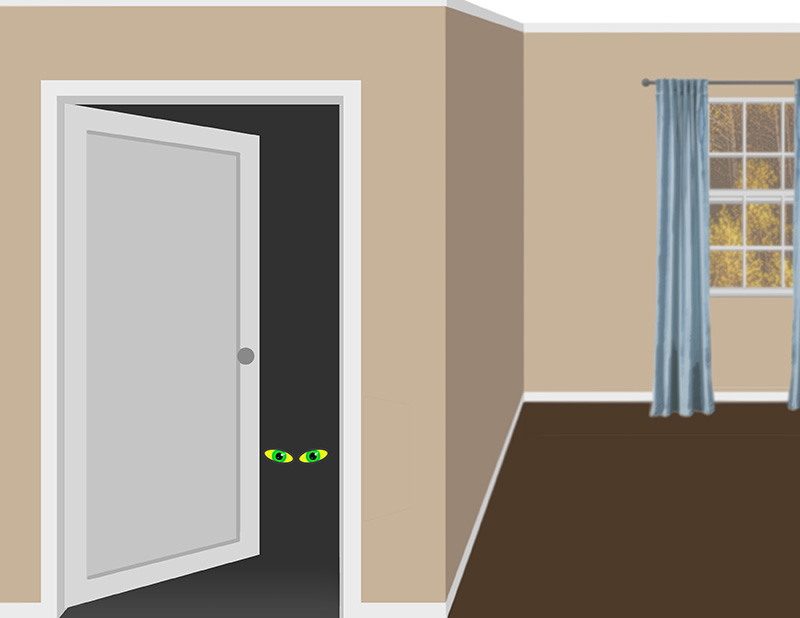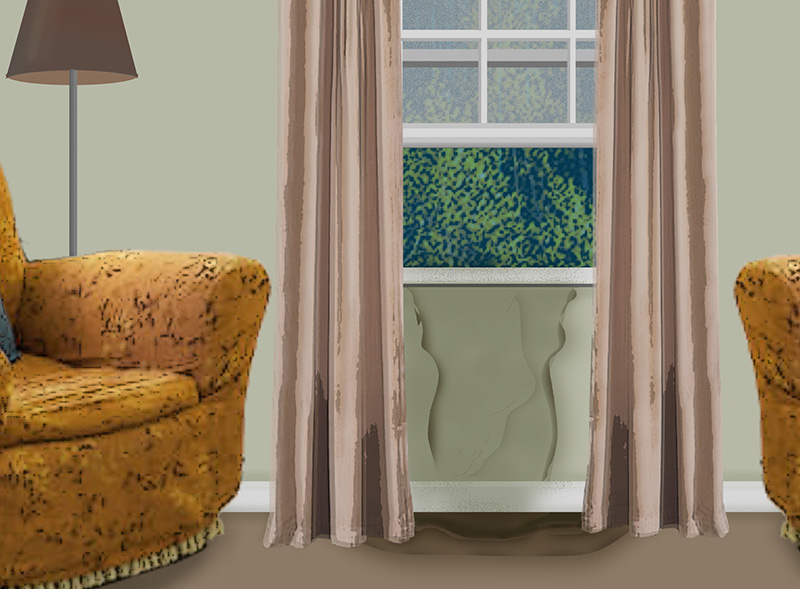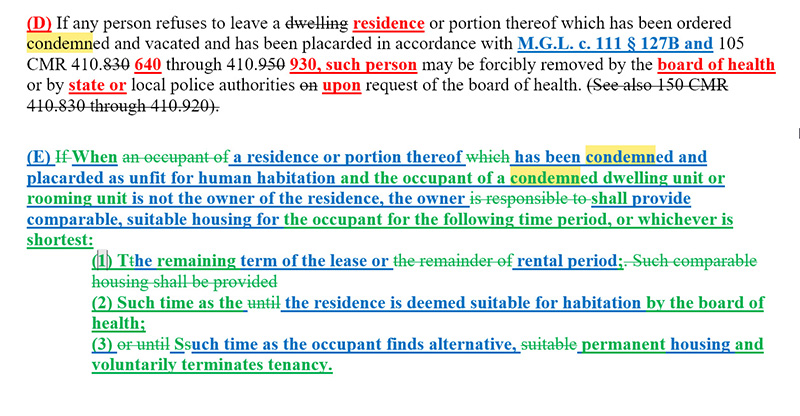2023 State Sanitary Code Changes Bring 10 New Requirements, Including Landlord Availability
By Kimberly Rau, MassLandlords, Inc.
The state of Massachusetts is making several changes to 105 CMR 400 and 105 CMR 410, also known as the state sanitary code. This code, which outlines the minimum standards of fitness for human habitation, is the standard that all landlords must abide by to rent property in Massachusetts.

The 2023 state sanitary code has 3,831 changes compared to the 2022 (current) version. The new version becomes effective April 1, 2023. This article will highlight some of the biggest changes coming for landlords. Image License: Public Domain.
These changes become effective as of April 1, 2023. Some, such as pest inspections, will only apply when you are renting to new tenants. Others, such as new standards for kitchens or excess moisture, will apply to your rental units immediately.
Since 1973, landlords in Massachusetts have been bound by an implied “warranty of habitability” whenever they list a unit for rent. This warranty of habitability guarantees that the rental unit is in compliance with the state sanitary code. For residential rentals, you cannot rent out a noncompliant unit “as is.” That means it’s important to know the changes coming to the sanitary code before April 2023. You don’t want to be caught unaware.
These are the minimum standards for rentals. Your municipality is always free to enact more strict rules for landlords, so make sure to check with your city or town about what they require as well.
Remember: The State Sanitary Code is Not the Building Code
The state sanitary code is different from the building code. The state building code, which derives from the International Building Code, applies to new, permitted construction. The state sanitary code applies to all rentals all the time.
There are times when the sanitary code will reference the building code. This is often for things such as fire safety. For example, the sanitary code says that rooms must have the proper number of egresses, which is outlined in the building code.
Now, working room by room, let’s look at what’s changing for landlords in 2023.

Of course there aren’t really monsters lurking in the closet, but nevertheless, the state sanitary code will require landlords to hardwire lighting into closets that do not get sufficient light from the room. Deep walk-in closets are almost certainly on that list. Image License: CC by SA 4.0 MassLandlords, Inc.
Closets in Rentals: Let There Be Light
Think about the closets in your rentals. Are they relatively shallow? In that case, the light from the room is probably enough to illuminate the closet’s interior. But if you have very deep closets, such as walk-in closets, or closets that turn a corner, the room’s light is not likely to be sufficient.
When the sanitary code changes take effect in April 2023, closets that do not receive enough light from the surrounding room will be required to have their own light. The code specifies “electric light switches or sensors, and light fixtures in good working order,” so battery-operated options appear to be insufficient to meet code requirements.
Hallways of Multi-Unit Rentals: No More Light Switches
Speaking of lighting, if you have an apartment building or other multi-unit rental with common hallways, wall switches are no longer allowed for these areas in 2023. You can use motion sensors or timers to provide light to these areas, or simply keep the lights on all the time.
The rationale here is likely fire safety. In the event of an emergency, you don’t want people unfamiliar with the area searching for the lights. It also ensures that residents are not walking down dark hallways, which could be a safety concern even under normal circumstances.
In the Kitchen: Waterproofing and Appliance Requirements
Starting in 2023, landlords are required to have a waterproof seal behind the kitchen sink. This means the wall above a kitchen or pantry sink must have a “smooth, non-absorbent, and easily cleanable surface” that extends at least 24 inches up the wall where practical. This surface must form a waterproof seal with the countertop. You can use caulk to do that.
This surface cannot be wallpaper or unfinished drywall, but it doesn’t have to be a tile backsplash, either. It can be gypsum board, as long as it’s applied properly and coated with paint or another appropriate sealant.
The floors in kitchens and pantries must also be waterproof starting in 2023. The floor must be smooth, non-corrosive and non-absorbent. Wood floors are only allowed if they have a water-resistant finish. They also cannot have cracks that can accumulate debris or allow pests to live.
When it comes to appliances, the current sanitary code says landlords must provide “space and proper facilities for the installation of a fridge.” Starting in April, new verbiage makes refrigerators with freezers and at least 11 cubic feet of combined storage space required kitchen appliances. The only exception is if your lease specifically states that your renter will be bringing their own refrigerator.

Excess moisture doesn’t just apply to bathrooms, though that is a common spot where water can build up. Be on the lookout for other areas of the home that show signs of excess moisture, such as under windows. The inspectors will be checking.
Throughout the House: Beware of Excess Moisture
Mold has always been something that sanitary code inspectors check for. But with the new changes to the sanitary code, inspectors are moving away from looking for physical signs of mold. Mold spores are everywhere, but inspectors will be looking for conditions that suggest a rental unit will end up with unusual amounts of mold. This means they will be checking for excess moisture, which can lead to mold.
How do you know if a room has excess moisture? It might not be as obvious as a puddle on the ground or water on the inside of a windowsill when it rains. In rooms with tile on the floor or walls, darkness in the grout implies the presence of moisture. Staining under a sink can also be a calling card of too much moisture in the area. If excess moisture is found, the inspector can require you to put in a mechanical fan for ventilation.
If you aren’t sure where excess dampness is coming from, check structural elements such as windows and pipes. Also examine the seals around bathtubs, sinks and showers. Is everything watertight? Look for small issues that can cause big problems, such as the plastic liner for the shower curtain. If it is too short to stay in the tub reliably, water may be streaming onto the floor whenever someone takes a shower.
Landlords of All Rentals: Be Reachable at Your Contact Number Twice a Day
The state sanitary code has long required landlords to let their tenants know how to get in touch with them. This meant publishing your phone number in a common area and monitoring it in such a way that renters could expect a response within 24 hours.
The requirement to publish your contact information isn’t changing. But starting in April, you must monitor that phone number no less than once every 12 hours. If you are away and/or unable to check in with that number, you must provide your renters with an alternate contact person and phone number until you return.
Changes for Rooming Houses, Furnished Apartments and Landlords Who Rent by the Room
Rooming houses and apartments that rent by the room (where allowed) also have some changes coming in 2023. The rule has always been that in rooming houses, bathrooms must be cleaned and sanitized at least once every 24 hours (more if necessary). Now, kitchens in such rentals must also be cleaned and sanitized by the owner at least once every 24 hours.
Rooming house kitchens must also be located in an area that is commonly accessible to everyone in the rental. This means you cannot keep the kitchen in one rental area, or require tenants to walk through someone else’s room to get to it.
If you are renting out a furnished apartment, and you typically provide linens, the sanitary code now requires you to wash and clean them regularly. This means weekly laundering for linens. If you are not prepared to fulfill that requirement, we suggest you gift your tenants the bedlinens upon move-in, and let them know that they’re theirs to keep, and launder, as they see fit. We should note that this suggestion has not been tested. The requirement to clean linens weekly was aimed at homeless shelters, but landlords who rent furnished rooms are also included.
All Landlords: Before You Rent, Check for Pests
Under the existing sanitary code, landlords are compelled to keep rental units free from pests. Landlords of one-unit rentals had to provide the means for keeping pests out of the rental (such as screens on windows), and the occupant was responsible for extermination. Landlords of multi-unit rentals were responsible for both providing the means of keeping pests out of the units and extermination.
Very little is changing on that front in April. Owners must still maintain the structural elements to keep pests out of one-family rentals, and the occupants must work to keep the home free of pests and eliminate them if they should turn up. Multi-unit landlords are still responsible for pest prevention and elimination, as well as structural maintenance.
However, there is a new requirement. All landlords must perform pest inspections prior to any new tenancy. You must inspect for pests, including insects and wildlife, document the inspection and be prepared to show it upon request from the building inspector. The new revisions don’t include a checklist for landlords, so we’ve come up with an inspection checklist that you can tailor to work for you. Make sure you use this, or your own checklist, and have a storage plan in place for those inspection forms in case you’re ever asked to produce them.
Your inspection should include whether any pests are present, any entry points you found and any other results of the inspection. You should also document any repairs that were made after the inspection. If you use an exterminator, make sure your documents include their license number. And finally, include the date of your follow-up inspection. This will document when you were able to determine your repairs were effective in stopping any issues you found.
This requirement is effective for any tenancies that begin on or after April 1, 2023.

The requirement that landlords provide housing for their tenants for either the remainder of the lease or the rental period, whichever is shorter, in the event of housing condemnation, is one of the biggest changes to the sanitary code. It’s also one of the changes that didn’t get time for public comment, as it was added in the third round of revisions. Image license: public domain.
If Your Rental Unit is Condemned, What Happens to Your Tenants?
The process to condemn a building or rental unit is not quick or simple, but it does still happen. If the board of health condemns a property, that means that it is considered unfit for human habitation and must remain uninhabited until it can pass inspection.
If you are a landlord and your rental unit is condemned while you have people living in it, you cannot just tell your tenants to leave without providing them somewhere to go. Starting in April, the state sanitary code will stipulate that you must provide housing for the remainder of the renter’s lease or the remainder of the rental period, whichever is shorter.
This is a big deal and something that landlords should pay special attention to. The legislature does not appear to have authorized the Department of Public Health to take such a bold step, but this new verbiage will effectively override any force majeure clause in your lease. This is the portion of your rental agreement that terminates the lease in the event that the rental unit is destroyed by fire or natural disaster, or taken by some kind of government action, including eminent domain.
This change also opens the door to other concerns. The public wasn’t able to ask questions during the notice and comment period, because this clause was only added during the third round of revisions, in response to comments in the second round of revisions. One big question is, if the landlord is responsible for housing their displaced tenants, who is responsible for any issues with the new housing?
Imagine a scenario where you must put your tenants up in a hotel because your rental is condemned. The hotel has a strict no-smoking policy, and your renters violate that. Who pays the smoking fee, which can be hundreds of dollars? The hotel won’t go after the renters for damages, they’ll go after you because you’re the one paying for the room. Then, suppose the renters counterclaim on the basis of conditions. Who is responsible for that, the landlord, or the hotel? Some hotels may allow you to have your renter put down their own credit card for incidentals and damages, requiring you to only pay for the room, but check with a lawyer before attempting this.
This seems like a shaky way to enact policy. We expect it to be challenged at some point, but in the meantime, do your best to keep your units in a condition that won’t lead to their condemnation.
Why Is Compliance with the State Sanitary Code So Important for Landlords?
You should be in compliance with the state sanitary code for many reasons. The most important one is that everyone deserves a safe, healthy place to live. As a housing provider, the onus is on you to provide that for your renters.
Practically speaking, not following the sanitary code is a recipe for headaches. If you need to serve an eviction for nonpayment, your tenant may counterclaim and tell the judge that their home is in violation of some aspect of the sanitary code. This can add weeks or months to your summary process time.
Your tenant may also withhold rent until necessary repairs are completed, which is legal under MGL Ch. 239, Section 8a. They may also take it upon themselves to make repairs and then deduct it from the rent they owe. This is also lawful, under MGL Ch. 111, Section 127L.
And don’t forget, if your tenant asks for an inspection and you need to terminate their tenancy for any reason within six months of that inspection (even if you make the repairs right away), your tenant can claim that you are retaliating against them for reporting you. Retaliation is unlawful, and it can be tricky to prove you weren’t retaliating by ending their tenancy, even if you have a good reason. Do your best to avoid these issues by following the sanitary code and fixing issues as soon as possible.
Frequently Asked Questions
Do I have to use a licensed exterminator for the pest inspection?
No, you can inspect the unit yourself and produce the report yourself as a landlord. If you find you need to perform work that requires a licensed exterminator, you must still hire the exterminator for that. Do not apply bait or poison without a license.




